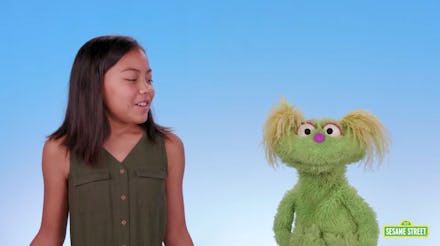'Sesame Street' introduces Karli, a muppet whose mom struggles with addiction

Countless American kids are paying the price of the opioid crisis, and the creators of Sesame Street have taken note, the Guardian reported. The long-running children’s show recently introduced a new muppet to the gang — Karli, whose mom struggles with opioid addiction. She’s a pal of Elmo’s and appears in free, supplemental educational content Sesame Street publishes online.
Show producers said they wanted to address addiction on the show after they learned that 5.7 million kids under 11 live in households with a parent battling substance abuse. “My mom was away for awhile, because she had a grown-up problem,” Karli tells another monster in a clip from Sesame Street.
The show has a noble history of tackling delicate issues with grace. Its educational database is full of resources for parents, kids, and caregivers on topics ranging from eating healthy on a budget to incarceration. In 2017, writers introduced a character with autism. Sesame Street addressed death in 1982, when one of its beloved residents, Mr. Hooper, passed away. The show has also tackled tough subjects like racism and adoption in its lauded past.
In the forthcoming segments on addiction, Karli the muppet is joined by 10-year-old Salia Woodbury, whose parents are in recovery from opioid dependence. “Both of our parents have had the same problem – addiction,” Karli says in the video.
“My mom and dad told me that addiction is a sickness,” Woodbury says.
“Yeah, a sickness that makes people feel like they have to take drugs or drink alcohol to feel okay,” the muppet adds. “I felt like my family was the only one going through it. But now I’ve met so many other kids like us, Salia. It makes me feel like we’re not alone.”
“Right, we’re not alone,” Woodbury says. “And it’s okay to open up to people about our feelings.”
Video writers and producers used carefully considered language in the segment, choosing “addiction” over “substance abuse,” for example, to make terms easier for children to understand. The monster and human co-hosts teach kids affected by addiction ways to help them feel better when they’re blue, like art therapy and breathing exercises.
Pediatric therapist Jerry Moe, national director of the Hazelden Betty Ford Children’s Program, helped Sesame Street craft their videos. He told the Guardian he was glad to contribute, because there’s a lack of resources on addiction for very young children. “These boys and girls are the first to get hurt and, unfortunately, the last to get help,” he said. “For them to see Karli and learn that it’s not their fault and this stuff is hard to talk about and it’s okay to have these feelings, that’s important. And that there’s hope.”